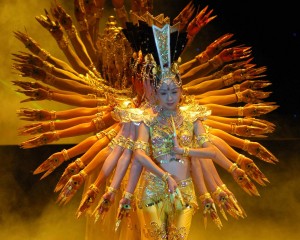An excerpt from a teaching by Jetsunma Ahkon Lhamo from the Vow of Love series
If we studied Bodhicitta, or the mind of compassion, every single day for the rest of our lives, we wouldn’t even scratch its surface because it is so profound. There are many different levels at which we might come to understand its meaning. The word Bodhicitta can’t really be translated into English very well. It means enlightenment. It also means compassion. Compassion to us means something quite ordinary. We might think that we already understand compassion. We may think, “I don’t eat meat anymore, and I try not to kill things. I try not to hurt anybody, and I feel sorry for most everybody, you know. Therefore I fully understand compassion.” Unfortunately, if we think like that, we’re probably missing a lot, and we fail to understand the real meaning of enlightenment. If we think we understand enlightenment the way most Americans do, I’m afraid we don’t have a clear view of it, because we haven’t had teachings on what that mind, which is free of conceptualization as well as discursive thought, is really like. We just haven’t had that kind of teaching.
When we think of an enlightened being, we think of someone who dresses up a certain way. He or she wears robes and almost always has their eyes turned skyward. We have many different ideas about enlightenment and, unfortunately, none of them are true. The Buddhas and Bodhisattvas who are reported to appear in the world, for instance, take many different forms. They don’t have to be a Buddhist to be a Bodhisattva; they just have to have realization. They take whatever form is necessary in order to benefit beings, because that is how the mind of compassion works. That is how the mind of enlightenment functions. It does not cling to the idea of self. It does not cling to egocentricity. Literally, a Bodhisattva might appear in the world as food or drink, offering its body in that way to benefit beings. It might appear in the world as a teacher. It certainly might do that. It might appear in the world as an ordinary, funky-style person. I mean funky beyond belief! Unless you have traveled in India and Nepal, you don’t know what funky means yet! A Buddha or a Bodhisattva might appear in such a way that is funky beyond belief, and yet within the context of that life, has an incredible impact on many people, or on just two or three people who themselves go on to achieve realization and have an incredible impact on beings.
You see, the mind of the Bodhisattva is such that it doesn’t cling to the idea of greatness. There is no thought of greatness. The moment we think we have to be great, or have to wear a certain kind of robe, or look a certain way, or do a certain dance, we have lost the entire idea and the main reason why a Bodhisattva would wish to incarnate in the world. A Bodhisattva’s only purpose is to benefit beings, and that is done without attachment to form and content. It is done in whatever way is necessary.
Copyright © Jetsunma Ahkon Lhamo. All rights reserved












Thank you Jetsunma for another wonderful teaching you have posted here. I really appreciate having the opportunity to experience this and ability to read and contemplate it over and over again until hopefully at least a small essence of it clicks in my mind and then continues to mature.
Blessings and prayers for your health and long life. May all my actions help all sentient beings.
“One day on the Spiritual Mountain (a.k.a. Vulture Peak), an assembly gathered to hear the Buddha’s Dharma talk. However, on that occasion, Buddha simply held up a flower offered by the Brahma King and gazed at the assembly, without saying a word. No one understood the meaning except Mahakashyapa, who broke into a smile. Thereupon the Buddha said, “I have the true Eye of the Dharma, the profound Mind of Nirvana, the Reality transcending all forms; the supreme and subtle teaching, inexpressible by words and speech; this mind seal outside of scriptures, I now transmit to Mahakashyapa.” Mahakashyapa later became known as the first Patriarch of Zen.”
http://ctzen.org/sunnyvale/enChineseZenMasterLec1.htm
Thanks to you Your Wisdom !! I’m enlightened and my doubts are removed.
Thanks again.
Thank you, Jetsunma.